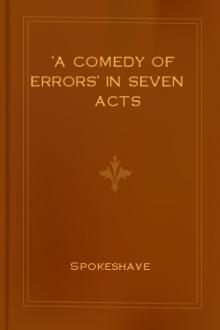Tales of St. Austin's by P. G. Wodehouse (unputdownable books .TXT) 📖

- Author: P. G. Wodehouse
Book online «Tales of St. Austin's by P. G. Wodehouse (unputdownable books .TXT) 📖». Author P. G. Wodehouse
'Now then, now then,' he said. Prater's manner is always abrupt.
'What's this? I can't have this. I can't have this. Get up at once. Where's Bradshaw?'
I rose gracefully to my feet, thereby disclosing the classic features of the lost one.
'The Headmaster wants to see you at once, Bradshaw, at the School House. You others had better find something to do, or you will be getting into trouble.'
He and Bradshaw left together, while we speculated on the cause of the summons.
We were not left very long in suspense. In a quarter of an hour Bradshaw returned, walking painfully, and bearing what, to the expert's eye, are the unmistakable signs of a 'touching up', which, being interpreted, is corporal punishment.
'Hullo,' said White, as he appeared, 'what's all this?'
'How many?' enquired the statistically-minded Kendal. 'You'll be thankful for this when you're a man, Bradshaw.'
'That's what I always say to myself when I'm touched up,' added Kendal.
I said nothing, but it was to me that the wounded one addressed himself.
'You utter ass,' he said, in tones of concentrated venom.
'Look here, Bradshaw—' I began, protestingly.
'It's all through you—you idiot,' he snarled. 'I got twelve.'
'Twelve isn't so dusty,' said White, critically. 'Most I ever got was six.'
'But why was it?' asked Kendal. 'That's what we want to know. What have you been and gone and done?'
'It's about that Euripides paper,' said Bradshaw.
'Ah!' said Kendal.
'Yes, I don't mind telling you about it now. When Mellish had me up after school today, I'd got my yarn all ready. There wasn't a flaw in it anywhere as far as I could see. My idea was this. I told him I'd been to Yorke's room the day before the exam, to ask him if he had any marks for us. That was all right. Yorke was doing the two Unseen papers, and it was just the sort of thing a fellow would do to go and ask him about the marks.'
'Well?'
'Then when I got there he was out, and I looked about for the marks, and on the table I saw the Euripides paper.'
'By Jove!' said Kendal. We began to understand, and to realize that here was a master-mind.
'Well, of course, I read it, not knowing what it was, and then, as the only way of not taking an unfair advantage, I did as badly as I could in the exam. That was what I told Mellish. Any beak would have swallowed it.'
'Well, didn't he?'
'Mellish did all right, but the rotter couldn't keep it to himself. Went and told the Old Man. The Old Man sent for me. He was as decent as anything at first. That was just his guile. He made me describe exactly where I had seen the paper, and so on. That was rather risky, of course, but I put it as vaguely as I could. When I had finished, he suddenly whipped round, and said, "Bradshaw, why are you telling me all these lies?" That's the sort of thing that makes you feel rather a wreck. I was too surprised to say anything.'
'I can guess the rest,' said Kendal. 'But how on earth did he know it was all lies? Why didn't you stick to your yarn?'
'And, besides,' I put in, 'where do I come in? I don't see what I've got to do with it.'
Bradshaw eyed me fiercely. 'Why, the whole thing was your fault,' he said. 'You told me Yorke was setting the paper.'
'Well, so he did, didn't he?'
'No, he didn't. The Old Man set it himself,' said Bradshaw, gloomily.
6 — A SHOCKING AFFAIR
The Bradshaw who appears in the following tale is the same youth who figures as the hero—or villain, label him as you like—of the preceding equally veracious narrative. I mention this because I should not care for you to go away with the idea that a waistcoat marked with the name of Bradshaw must of necessity cover a scheming heart. It may, however, be noticed that a good many members of the Bradshaw family possess a keen and rather sinister sense of the humorous, inherited doubtless from their great ancestor, the dry wag who wrote that monument of quiet drollery, Bradshaw's Railway Guide. So with the hero of my story.
Frederick Wackerbath Bradshaw was, as I have pointed out, my contemporary at St Austin's. We were in the same House, and together we sported on the green—and elsewhere—and did our best to turn the majority of the staff of masters into confirmed pessimists, they in the meantime endeavouring to do the same by us with every weapon that lay to their hand. And the worst of these weapons were the end-of-term examination papers. Mellish was our form-master, and once a term a demon entered into Mellish. He brooded silently apart from the madding crowd. He wandered through dry places seeking rest, and at intervals he would smile evilly, and jot down a note on the back of an envelope. These notes, collected and printed closely on the vilest paper, made up the examination questions.
Our form read two authors a term, one Latin and one Greek. It was the Greek that we feared most. Mellish had a sort of genius for picking out absolutely untranslatable passages, and desiring us (in print) to render the same with full notes. This term the book had been Thucydides, Book II, with regard to which I may echo the words of a certain critic when called upon to give his candid opinion of a friend's first novel, 'I dare not say what I think about that book.'
About a week before the commencement of the examinations, the ordinary night-work used to cease, and we were supposed, during that week, to be steadily going over the old ground and arming ourselves for the approaching struggle. There were, I suppose, people who actually did do this, but for my own part I always used to regard those seven days as a blessed period of rest, set apart specially to enable me to keep abreast of the light fiction of the day. And most of the form, so far as I know, thought the same. It was only on the night before the examination that one began to revise in real earnest. One's methods on that night resolved themselves into sitting in a chair and wondering where to begin. Just as one came to a decision, it was bedtime.
'Bradshaw,' I said, as I reached page 103 without having read a line, 'do you know any likely bits?'
Bradshaw looked up from his book. He was attempting to get a general idea





Comments (0)